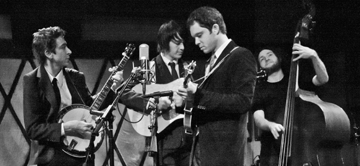
New York City is experiencing a revival in the traditional American music genres of bluegrass and old-time, and venues like National Underground, Spike Hill, Sunny’s and Rockwood Music Hall are becoming havens for this. On February 20th Rockwood Music Hall featured two of the city’s finest bluegrass bands on a co-bill with national touring band Holy Ghost Tent Revival.
I arrived in time to catch the headlining group The Five Deadly Venoms. The Venoms are a NYC, bluegrass super-group comprised of Elio Schiavo on lead vocals/mandolin, Rick Snell, on guitar/vocals, Todd Livingston on resonator, Bennet Sullivan on banjo, Rob Hecht on Fiddle and Patrick Falko on bass (subbing for Jared Engel). They opened the set by tearing through originals “River of Tears,” “Keep it Reel” and “Lonesome Road.” Acoustic bands are notoriously hard to mix live, and once the banjo and dobro were brought up the levels were stellar. Each instrument played into an individual mic with only one DI for the bass.
They did a great rendition of Norman Blake’s classic “Ginseng Sullivan,” with the solos democratically distributed. Highlights included tight and complex arrangements with high levels of sophistication that’s typically found in jazz and chamber music. After performing a few more originals The Venoms wound down the set with a change of pace covering “Honkey Tonk Blues,” sang by Todd Livingston, who transformed himself into a charismatic front man by bending notes with his voice. Members have shared the stage with everyone from Chris Thile to Sam Bush, and they proved that they have what it takes creativity and technically to represent the city’s bluegrass scene.
Following The Venoms was The Birdhive Boys, members include Zack Bruce on mandolin, Justin Camerer on guitar, Max Johnson on bass and Ellery Marshall on banjo. They dove right into some strait ahead, traditional bluegrass and tore through bluegrass classics, “Rollin’ in My Sweet Babies Arms” and “Freeborn Man.” Crowding around two condenser mics, they have almost perfected the signature bluegrass stack vocals by layering low, mid and high voices to create a sound made famous by Bill Monroe, the father of bluegrass. In addition, they played three originals including one written by the guitarist’s grandma.
The NYC bluegrass community is a subculture with a supportive community of musicians, centered around certain venues and open jam sessions. The jams create musical cross pollination, and informal musical education, pass the tradition on from one person to the next.
The NYC bluegrass and old-time community are a subculture all their own, with a supportive community of musicians, centered around certain venues and open jam sessions. The jams create musical cross pollination and informal education sessions passing the tradition from one person to the next. The community is all ages, and the scene is unpretentious with no egos and no drummers. All bands on the bill were raved about by the crowd, and now that this subculture has taken a solid hold here it can only remain underground for so long.


No Comments comments associated with this post